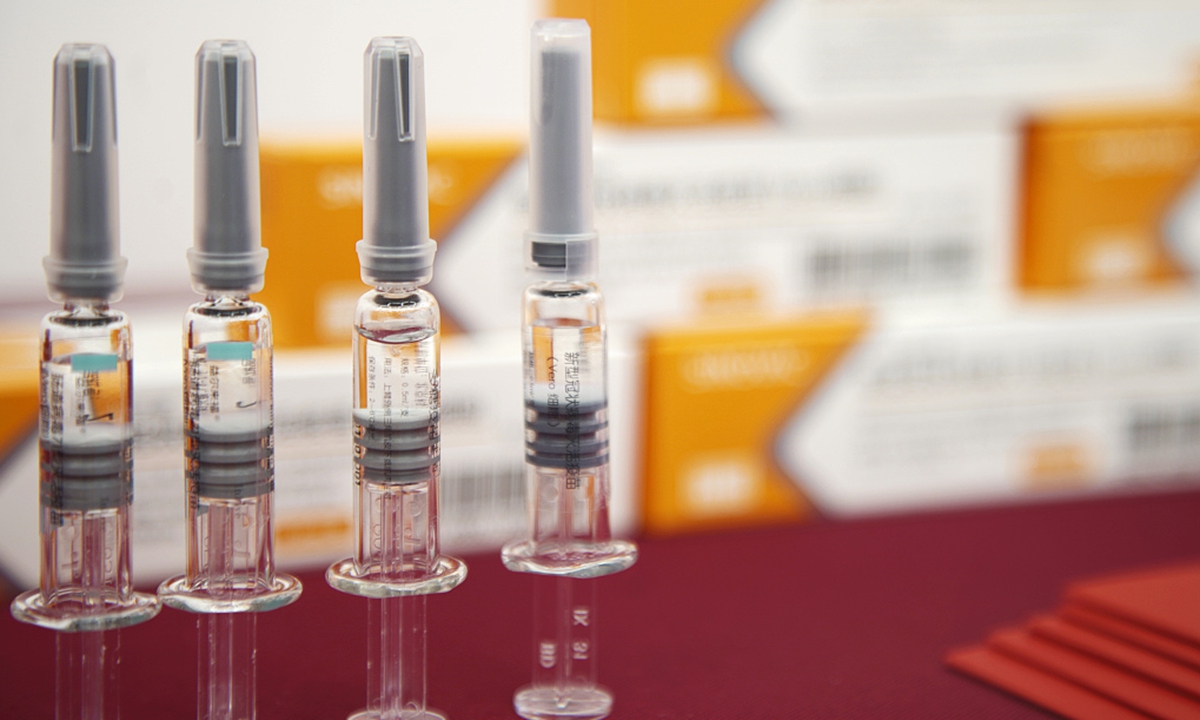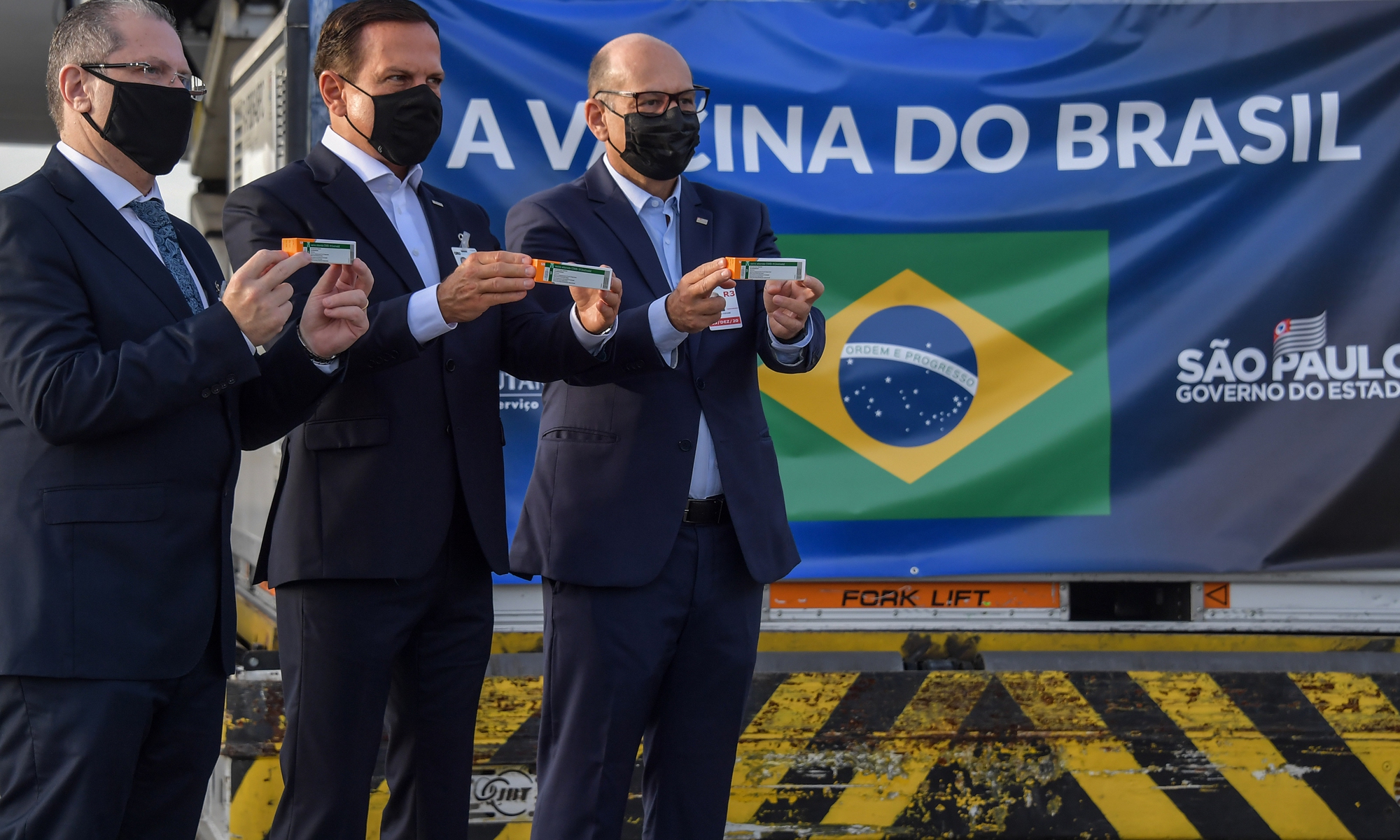UN session outlines roadmap to vaccination
By Chen Qingqing and Bai Yunyi Source: Global Times Published: 2020/12/4 0:08:40
Blame game could isolate Washington further as leaders step up anti-virus efforts

Sinovac's Covid-19 vaccine. Photo: VCG
What could the world expect from a special UN session, the first ever special session to address the COVID-19 pandemic, which is more than just a global health crisis and has been deeply reshaping the socio-economic landscape? Will coronavirus vaccines become a "Christmas miracle" and put an end to this dark winter as many countries see worst spikes in new infections with the holiday seasons approaching? These appear to be some of the questions the world is anxiously waiting the upcoming UN General Assembly session to answer.
Volkan Bozkir, President of the 75th session of the UN General Assembly, said today marks an overdue and much needed moment of reckoning.
The COVID-19 pandemic has disrupted life for everyone around the world. If has challenged our world in ways unlike any other crisis in the 75-year history of the UN.
Stubbornly insisting on some obsolete topics that the US had been using to attack China for months and smear its efforts in containing the COVID-19 outbreak, Washington is reportedly planning to use this multilateral event for its political purpose, again, by calling it a "stage for Chinese propaganda."
Citing an unnamed US official, Reuters reported on Thursday that this special session should have been held earlier, and the meeting had been "pre-engineered to serve China's purpose." However, the real point of this special meeting is to "galvanize concrete action" to approach COVID-19 response in a multilateral and collective manner, General Assembly spokesperson Brenden Varma was quoted as saying in media reports.
Contrary to Washington's narrow-minded focus on China's COVID-19 response, the world is waiting for some new concrete steps in fighting the pandemic, especially when some vaccines are almost ready for mass utilization.
Chinese President Xi Jinping's special representative, state councilor and foreign minister Wang Yi, will attend the special session, according to the Chinese Foreign Ministry. He will attend the general debate of the special session and deliver remarks via video link.
At present, a new wave of epidemic is raging, posing great challenges to fighting the epidemic, protecting people's livelihoods and stabilizing the economy, Hua Chunying, spokesperson of the Chinese Foreign Ministry, told a press conference on Thursday. The international community generally expects the UN to play a greater role in addressing the epidemic's challenges more effectively, she noted.
In this context, the UN special session on the epidemic is of great significance, and China will work with all parties to push the session to send a positive and powerful signal of safeguarding multilateralism and uniting against the epidemic, the spokesperson added.
"The meeting is held at a very critical moment, as we expect mass vaccination within a month while the pandemic is now at its worst," Zeng Guang, chief epidemiologist of the China CDC, told the Global Times on Thursday.
Developing the vaccines and the virus are racing against each other, and how to balance between the vaccination and epidemic prevention work will be a major question of concern, Zeng said.
Though there are many responses to the COVID-19 outbreaks, what's needed now is to bring together all countries, UN actors, the private sector and vaccine developers, Varma was quoted as saying in an AP report. As the world is now eyeing vaccination, some major vaccine developers such as BioNTech co-founders Ugur Sahin and Ozlem Tureci are expected to address the session, according to media reports.
In the last 24 hours, the world has seen much more vaccine-related news than before as the UK became the first country in the world to approve Pfizer-BioNTech vaccine for use, which raised the hope of turning the tide against the virus that has already killed 1.4 million people in the world. On Thursday, the first doses of vaccine made by Pfizer and BioNTech have been packaged in Belgium for being shipped to Britain this week, according to media reports.
Meanwhile, Russian President Vladimir Putin has ordered the start of a large-scale COVID-19 vaccination in the second week of December. Chinese companies are also required to prepare for mass production, as Chinese Vice Premier Sun Chunlan and State Councilor Wang Yong visited the National Institute for Food and Drug Control, and two leading vaccine producers Sinovac, and National Vaccine & Serum Institute under Sinopharm in Beijing, the Xinhua News Agency reported on Wednesday.
While the first day of the UN special session will focus on member states' experiences of fighting COVID-19, a series of panels will touch on subjects including the road to COVID-19 vaccination, as some medical experts also see a fair distribution of vaccines will be led by the WHO under the UN framework.
As first doses of vaccines will be limited, we will need to prioritize them for vulnerable groups like health workers and older people, Tarik Jašarević, spokesperson of the WHO, told the Global Times in an e-mail on Wednesday. "To address this, WHO has developed a Fair Allocation Framework in collaboration with ACT-Accelerator [a collaboration tool] partners and member states," Ja?arevi? said.
"The world is looking to the UN for leadership, to step up and take demonstrable action to address the greatest challenge our world is facing today," Bozkir said.
The UN official also proposed to ensure fair and equitable access to vaccines while strengthening political and resource mobilization for multilateral initiatives that aim towards far and equitable distribution of COVID-19 vaccine.

Sao Paulo Governor Joao Doria (center), Sao Paulo State Health Secretary Dr. Jean Gorinchteyn (left), and Butantan Institute Director Dimas Covas pose for photos next to a container carrying doses of the CoronaVac vaccine after it was unloaded from a cargo plane from China, at Guarulhos International Airport in Guarulhos, Brazil on Thursday. Photo: AFP
Further isolation of Washington
Though incumbent President Donald Trump doesn't plan to attend the session, as the UN agenda shows, US Health and Human Services Secretary Alex Azar is going to point fingers at China in an indirect way by bringing up some obsolete issues such as the lack of information sharing, and calling for holding it accountable for the response to the outbreak, according to Reuters.
Chinese officials, academics and media experts have provided clarifications on some US accusations for months, presenting clear points on issues such as the COVID-19 response in early stage of the outbreak and information sharing mechanism with the international community. Those rational voices, however, have not stopped the US-initiated attacks apparently.
"The US under the Trump administration has persistently negated global cooperation over COVID-19 in favor of political blame games," Tom Fowdy, a British political and international relations analyst, told the Global Times on Thursday.
Some US officials also suggested that they expected Beijing to push a narrative at the UN about the virus existing abroad before it was discovered in Wuhan, Central China's Hubei Province, last year, while some considered Chinese research into the origins and the cooperation with the WHO on the matter as "wholly unacceptable," according to Reuters.
Washington is expected to bring up the questions of origins of coronavirus into the special session, concerning the origin of the virus, "it is pivotal that countries place science before politics," Fowdy noted.
"This has been made difficult because some have insisted on doubling down a narrative of 'blame' and 'political responsibility' which dismisses all evidence that the virus could have emerged beyond China as propaganda," he added.
Some Chinese experts also noted that China does not seek to alter the virus origin narrative as some Western media claimed, and it is a fact that China may have been the whistleblower of the pandemic, as mounting academic and official evidences have shown the early existence of the novel coronavirus in multiple places around the world.
Officials and experts also called for a more open mind to answer the puzzle, which should be done by scientists around the world.
"The only way this can be overcome is if countries drop these blame games and stop making assumptions based on culture and ideology over the virus origin," the British scholar said.
Posted in: DIPLOMACY